Some years ago, varroa resistance had risen noticeably on my Elgon bees. Then I started to give away some breeder queens to the neighboring beekeepers. And they promised to graft from them to make new queens. In particular, Stig-Åke Gerdvall (board member of our association) and Peter Tesell (chairman). Radim Gavlovsky, who I began to cooperate with in queen breeding , took as many queen pupae and laying queens as he needed. This had of course also to fit into queen production for my own part and for the customers. The neighboring beekeepers in the local association already had Elgon bees, but now they were able to take part of the breeding successes faster and thus help to spread better drones in a more massive way in the area. (Click on the pictures to make them bigger, then click on the back arrow in the browser to get back to the text again.)
Share it – it will contribute back
I had tried a similar strategy earlier and it worked. Then, queens were tried in varroa infested areas, before the Varroa arrived in my area. And I could bring back valuable breeding material in the form of pieces of combs with young larvae to graft from.
Less reinvasion – reduced varroa pressure
Obviously, good bee colonies in the Elgon are many enough and have now helped each other to keep down the Varroa pressure in the surroundings. Individual colonies with maybe too many mites have not been able to start strong domino effects by contributing too much of reinvasion of mites. Reinvasion brought about by more resistant colonies who silently rob those being richer in Varroa mites.
Bee shaker test (alcohol test)
A couple of years ago, we also began to be more careful making bee shaker test and treat as soon as varroa levels were higher than 9 mites from 1 dl of bees, at least (about) 300 bees. Checked at least spring and summer.
The Elgon area
This has resulted in a very nice result. An area (about 15 x 10 km) in the center of the entire elgon area (about 50 x 10 km) which contains about 350 elgon colonies (in the center area) of good quality, and no other types of bees. Here, most of our queens are mated. Only about 50 of these colonies needed to be treated against varroa this year. There are probably more than 900 elgon colonies in the entire elgon area. Most of them has Thomas Dahl with 300. Johan Ingjald is increasing his numbers. There are several engaged new beekeepers going up in numbers.
Courses and support
Stig-Åke Gerdvall and Johan Ingjald (TBH-expert) hold beginners courses and queen breeding courses in our local association. They help the participants to get new good colonies, and to help them find good places to mate their new virgin queens. We have also organized a mating site for mini nucs which Peter Tesell manage.
Good figures
The annual losses are about 10% in the area. The harvests are good, and of course, vary with the availability of nectar in the various parts of the area. To the east, it is a problem to produce low crops due to the rich soils.
Regular meetings
We usually meet in Nov-Dec every year and talk about the season and planning the next. This year we are so many so we gather in a bigger locality in Hallsberg. Anyone interested is welcome. Four lecturers. Lessons from feral bees – R Gavlovsky, Knowledge from TBH and Warré – J Ingjald, Possibilities of the Beescanning app – B Lagerman, Tips for breeding resistant stock – E Österlund. Cooperation works well!
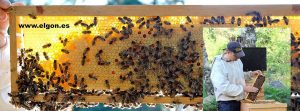
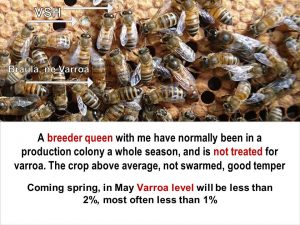
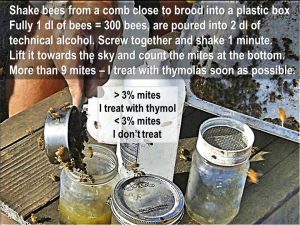
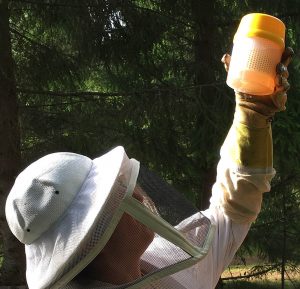
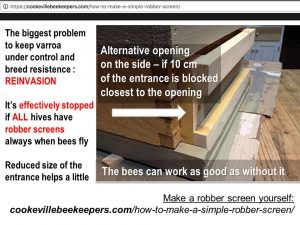
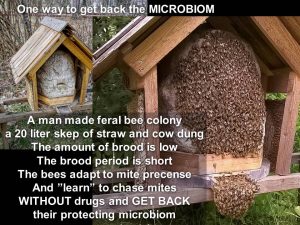
This is really wonderful and good strategy.
I tried to do a cooperation myself but realized that treatment free opinions differ very much.
Those who do the “live and let die” approach in my crowded environment which is flooded with hives, have no success if they are surrounded by beekeepers who treat prophylactically several times in season and therefore breed stronger mites and more virulent viruses. It´s mostly the drone influence and silent robbing that waters down the defense or the colonies that crash in season and spread mites from the surviving bees or are robbed.
Mostly some beekeepers believe they could stop treatments completely without regression and are disappointed. The use of more resistant stock for a start, which will then live long enough to adapt to the local circumstances and hopefully develop some epigenetic behaviour in the long run is much better, be it stock out of survivors or bred stock.
Myself I have seen this regression happen. One of the queens went into her third winter untreated now ( elgon F1), and I have a “feral” hive (AMM) like the skep mentioned above which survives now for two seasons without being checked, enclosed by many treated colonies and with a mite drop I will never tell anyone about (but no defect bees observed).
The treatment free interested were told that treatments are much more dangerous to the bees than the mite but at the beginning of selection, may it be natural or artificial , that´s not true. Here one can be lucky to not have 100% loss if treatments are stopped abruptly.
Our bees must become like ferals , and change from weak livestock to bees which can defend themselves against pests and watch out for dangers of brood disease, cleaning up a comb.
Regression in my eyes means to move to small and natural cell size, leave some honey, propagate microorganisms, start to have your own wax cycle to have foundations without contamination , a more natural hive configuration, a more natural orientated multiplying and many more….important too the hive air which contains the pheromones to communicate, which needs no disturbance.
I had the bad experience that a co-worker who got two splits just left them alone thinking they should make it on their own, but we had a drought and they starved and were robbed and killed.
So there is the need to find some co-workers who are just as enthusiastic and careful as you are if you start such a project. And find an isolated mating place to mate among all treatment free splits to preserve diversity.
Now, preparing for my first speaking I hope I will find them among the treaters as among some friends. I have no treatment free beekeepers directly near.
My offer is to care for the selection so they might care for the honey harvest they need for their income and let them try my queens.
Fear of loss is still a problem, but to have someone or a small group which breeds from two winter and three seasons survivors and gives those queens like a “hobbyist quest” to beekeepers who treat but are sick of it might be a goal.
Sibylle
Hi Sibylle,
Yes, we are happy in our association for the good situation among us. But it didn’t came overnight. It has taken many years to achieve this.
You have begun on a good path and achieved a good result, that’s my impression. The situation is different in every location. You have to adjust to the situation at hand. Coming year may show you new opportunities in more than one way. New insights that open up new ways to do things. New neighbors to cooperate with. New beekeepers to exchange breeding material with. New enough isolated area that can be used as a mating station, etc. You mention some achievements to continue working with, the AMM feral hive for example, which seems very virus resistant, probably due to two things, genetic virus resistance and renewed microbiom which has strengthened the immunsystem and keeps the microbes in balance.
Erik,
thanks for the answer to my ranting 🙂
You are well known and prominent but I´m not, so I hope to find well known bigger beekeepers who are interested and might try a new approach making it public.
So I´m very happy you permitted me to use the pictures and informations on your website and from the weeks I spent working with you in sweden.
It´s fine to see tf beekeeping working without high losses and with a good honey harvest and working together, sharing.
It´s an example. Perhaps my future speakings will start something and boost a cooperation.
It´s important not to exchange ideas on forums all the time but have it leading to something. It takes courage, but it must be practical beekeeping like in sweden, not theories alone.
Thanks, Sibylle